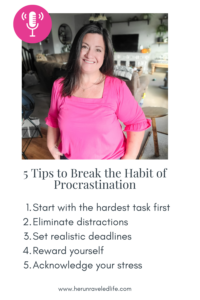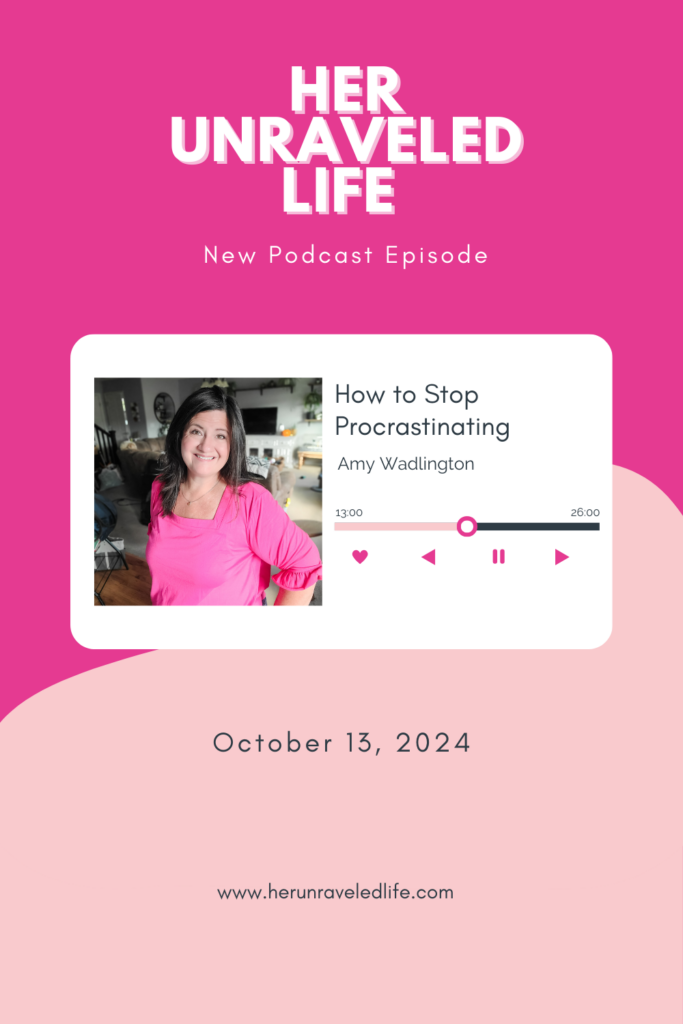With this free guide, you can rewire your mind in just 10-steps. This daily process is Biblical & Science backed. Think more positive in 90 days,
rENEW yOUR miND
Free DownlOAD
Transformational coaching for Kingdom women
Christian Life Coach
for women
type below and hit enter
Search the blog
Let Me Help You
You know God has called you to impact the Kingdom with your calling but now you feel stuck and just need God to show you how to do what He's asking you to do. Turn the fear of messing it up and the doubt of how to move forward into clarity and confidence with Christian Life Coaching. Let's chat!
I'm Amy
stop overthinking, Worry, & Negative Thoughts
How to Stop Procrastinating | ep 22
October 12, 2024

How to Stop Procrastinating: Faith-Based Tips for Breaking the Cycle
If you’ve ever found yourself scrolling on your phone or binge-watching Netflix when there’s work to be done, you’re not alone! Procrastination happens to all of us, but it’s important to remember: you are not a procrastinator—you just have a habit of procrastinating. And guess what? Habits can be broken.
In this post, I’ll dive into what procrastination really is, why we do it, and how to stop procrastinating. As a Christian life coach, I believe that with the right mindset and spiritual tools, you can overcome procrastination and step into your God-given purpose.
(Prefer to listen? Click play below or head over to Apple to learn How to Stop Procrastinating.)
What is Procrastination?
Let’s be clear: procrastination is a habit, not an identity. As Mel Robbins says, “You are not a procrastinator, you have a habit of procrastinating.” This is such an important distinction! When we label ourselves as procrastinators, we reinforce that belief and keep ourselves stuck. But the truth is, procrastination is just a pattern we’ve learned over time—something we can unlearn.
Procrastination usually follows a simple loop: trigger, pattern, reward. You might feel stressed or overwhelmed (trigger), so you avoid the task (pattern), and then feel temporary relief (reward). But here’s the catch: that relief doesn’t last. The stress comes back, often worse than before.
Causes of Procrastination
Understanding why you procrastinate is the first step to overcoming it. Here are a few common reasons:
1. Overthinking
Have you ever found yourself analyzing something so much that you can’t make a decision? This is called analysis paralysis, and it’s a major cause of procrastination. When you get stuck in your head, weighing all the possibilities, you end up doing nothing.
2. Overlearning
Sometimes we convince ourselves we need more information before we can start. Maybe you’re working on a project and think, “If I just research a little more, I’ll be ready to begin.” But the truth is, you’ll never have all the information. Sometimes, you just need to start and trust that you’ll figure things out along the way.
3. Perfectionism
Perfectionism tells us that if we can’t do something perfectly, we shouldn’t do it at all. But perfectionism is a trap. It keeps us from taking action because we’re afraid of making mistakes. Instead of aiming for perfection, aim for progress.
4. Procrastination as Stress Relief
Procrastination is often a form of stress relief. When you’re already stressed, taking on another task can feel overwhelming—like it’s just too much to handle. Your nervous system says, “Hold on, I need some relief,” while your mind is saying, “I really need to get started on this.” Learning to calm your nervous system through prayer, deep breathing, or a short walk can help you break this cycle.
5. Overstimulation
In today’s world, we’re constantly bombarded with information, notifications, and distractions. This can lead to overstimulation, making it harder to focus on important tasks. Calming your mind and eliminating distractions are essential for overcoming procrastination.
6. Poor Time Estimation
Many of us are terrible at estimating how long tasks will take. Think back to school when your teacher gave you eight weeks to complete a project. It felt like forever, so you put it off—until the night before it was due! To fix this, break your tasks into smaller, more manageable chunks. For example, if you have a project due in eight weeks, and you can dedicate one hour a day, five days a week, that’s 40 hours to work with. Break it down into 40 one-hour tasks, and suddenly it feels much more manageable.
Dealing with the Spiritual Aspect of Procrastination
Fear plays a huge role in procrastination, especially when it comes to stepping into your calling. Fear of failure, fear of success, and fear of the unknown can hold us back. But remember what Scripture says: God didn’t give us a spirit of fear, but of power, love, and a sound mind (2 Timothy 1:7).
How do we overcome fear? We trust in God’s plan. We pray for His guidance, and then we take action—even when it feels scary. Because sometimes, the only way to overcome fear is to move through it.
Another spiritual aspect of procrastination is recognizing the enemy’s tactics. The enemy came to steal, kill, and destroy—he wants to kill your dreams, steal your God-given destiny, and destroy your faith. But we don’t have to let him. By using the authority we have in Christ, we can tell the enemy to leave and stand firm in our purpose.
How to Break the Habit of Procrastination
Breaking the habit of procrastination comes down to understanding the habit loop: trigger, pattern, reward. You can’t always control the trigger—stress, fear, and feeling overwhelmed will come up. But you can change the pattern.
One of the best ways to break the pattern is by using the 5-minute rule. When you feel the urge to procrastinate, commit to doing the task for just five minutes. Whether it’s replying to an email, starting a project, or cleaning up, just start. Most of the time, once you begin, you’ll keep going. But even if you stop after five minutes, you’ve already broken the pattern of avoidance.
Also, make sure to acknowledge the stress. Procrastination is often a way to avoid dealing with stress. By addressing the stress directly—whether through deep breathing, mindfulness, or prayer—you can take the power back and stop using procrastination as a coping mechanism.

Tips to Stop Procrastinating Now
Let’s get practical with some tips to help you stop procrastinating today:
- Start with the hardest task first. This is known as the “eat the frog” method. By getting the most challenging task out of the way early, the rest of your day will feel easier.
- Eliminate distractions. Turn off your phone, close unnecessary tabs, and create a space where you can focus. Apps like Freedom or Focus@Will can help you stay on track.
- Set realistic deadlines. Break big projects into smaller, time-bound tasks, and don’t set impossible deadlines.
- Reward yourself. Celebrate small wins to reinforce positive habits.
- Acknowledge your stress. If procrastination is your way of relieving stress, find healthier ways to deal with that stress—through prayer, deep breathing, or taking a short walk.
Conclusion: You Can Break Free from Procrastination
Procrastination is just a habit you’ve built over time, and with the right tools and mindset, you can break free from it. Whether it’s overthinking, perfectionism, or fear that’s holding you back, remember this: you are fully capable of breaking the cycle and stepping into the life God has called you to live.
If you’re feeling stuck and need more support, I’m here for you! As a Christian life coach, I’d love to work with you one-on-one to help you overcome procrastination and step into your calling. You can book a free breakthrough call with me at amywadlington.com/services.
More Episodes You May Enjoy
5 Steps to Live Your Identity in Christ
Tips to Overcome Limiting Beliefs
Tips to Help: “Why Am I So Unmotivated?”
Let’s Work Together
Ready to learn how to stop procrastinating so you can live the life God created you for? Book a call with Christian Life Coach, Amy today!


Other Posts You Might Enjoy
Most Binge-Worthy Episodes
The Go-To Podcast with prophetic insight to help women break free from fear, overwhelm, and confusion—so they can step boldly into their God-given calling with peace and clarity.
57
Self-Doubt Keeping You Stuck? My #1 Tip To Get Breakthrough as a Christian Woman
From Self-Doubt to Self-Confidence: Kristin’s Breakthrough Story
Exhausted and Ready to Quit? Build Self-Confidence by Trusting God
Biblical Encouragement for Hard Times -How to Stay Grounded Even When It Feels Like Everything Is Falling Apart
The Basics of Imposter Syndrome and How to Finally Feel Confident Again
56
55
58
65
TOP
2.5%
Global Ranking
I'm Amy and I help ambitious women of faith breakthrough, get more energy & clarity, stop cravings, and finally feel good again!
Read more about me
I'm so glad you're here
Hello!
For tips and updates follow me on Insta @amywadlington
find me on
As a faith based life coach, my mission is to help Christian women stop being controlled by their thoughts and emotions, silence the attacks of the enemy. Read my full story.
Get unstuck so you can impact the Kingdom with your calling
Christian Life Coach
Podcast
Listen to the Podcast
© 2026 Amy Wadlington. all rights reserved. made with Love In Colorado privacy policy
Website Design & SEO Amy Wadlington, Christian Life Coach
Wondering ‘What’s my next step?'
Feel Certain about what to do In Just 1 Hour